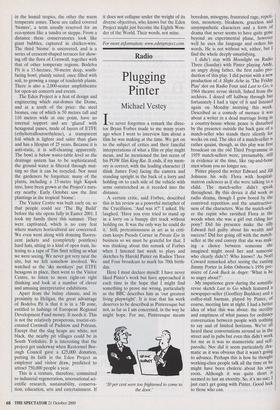Radio
Plugging Pinter
Michael Vestey
I've never forgotten a remark the direc- tor Bryan Forbes made to me many years ago when I went to interview him about a film he was making at the time. We got on to the subject of critics and their fanciful interpretations of what a film or play might mean, and he mentioned the last scene of his POW film King Rat. It ends, if my mem- ory is correct, with the leading character (I think James Fox) facing the camera and standing upright in the back of a lorry and holding on to each side of the vehicle with arms outstretched as it receded into the distance. .
A certain critic, said Forbes, described this in his review as a powerful metaphor of the Crucifixion. 'And was it?' I asked. He laughed. 'Have you ever tried to stand up in a lorry on a bumpy dirt track without holding on. It was the only way he could do it.' Still, pretentiousness in art as in criti- cism keeps Pseuds Corner in Private Eye in business so we must be grateful for that. I was thinking about this remark of Forbes when I listened last week to plays and sketches by Harold Pinter on Radios Three and Four broadcast to mark his 70th birth- day.
Here I must declare myself: I have never liked Pinter's work but have approached it each time in the hope that I might find something to prove me wrong, particularly as the BBC describes him as 'our greatest living playwright'. It is true that his work deserves to be described as Pinteresque but not, as far as I am concerned, in the way he might hope. For me, Pinteresque means 30 per cent were too frightened to come to the door.' boredom, misogyny, frustrated rage, repeti- tion, monotony, bleakness, graceless and unsympathetic characters and a form of drama that never seems to have quite gone beyond an experimental phase, however well he uses the language and orders his words. He is not without wit, either, but I find the whole deeply unsatisfying.
I didn't stay with Moonlight on Radio Three (Sunday) with Pinter playing Andy, an angry dying father, the first radio pro- duction of this play. I did persist with a new production of A Slight Ache in 'The Friday Play' slot on Radio Four and Last to Go, a 1964 theatre revue sketch, fished from the archives. 1 dozed off halfway through but fortunately I had a tape of it and listened again on Monday morning this week. Described as a comedy of menace it was about a writer in a dead marriage living in a country-house whose peace is disturbed by the presence outside the back gate of a match-seller who stands there silently for weeks on end. The idea of a match-seller is rather quaint, though, as this play was first broadcast on the old Third Programme in 1959 match-sellers were, presumably, still in evidence at the time, like rag-and-bone men whom you no longer see. Pinter played the writer Edward and Jill Johnson his wife Flora with hospital- matron cadences as if she were talking to a child. The match-seller didn't speak throughout. By this device it did work as radio drama, though I grew bored by the contrived repetition and the unattractive- ness of the characters. Was the match-sell- er the rapist who ravished Flora in the woods when she was a girl out riding her pony? Did his presence make the silly Edward feel guilty about his wealth and success? Did her going off with the match- seller at the end convey that she was mak- ing a choice between someone she imagined might need her and someone who clearly didn't? Who knows? As Noel Coward remarked after seeing the ranting Jimmy Porter in John Osborne's 1956 pre- miere of Look Back in Anger: 'What is he so angry about?'
My impatience grew during the somnific revue sketch Last to Go which featured a newspaper-seller (Geoffrey Bayldon) and a coffee-stall barman, played by Pinter, of course, meeting late at night. I had a better idea of what this was about: the sterility and emptiness of what passes for ordinary conversation between people with nothing to say and of limited horizons. We've all heard these conversations around us in the street and in pubs but even this didn't work for me as it was so manneristic and self- parodic. Nor did it seem particularly dra- matic as it was obvious that it wasn't going to advance. Perhaps this is how he thought working-class people talk all the time or he might have been choleric about his own roots. Although it was quite short it seemed to last an eternity. So, it's no use; just can't get going with Pinter. Good luck to those who can.

























































































 Previous page
Previous page